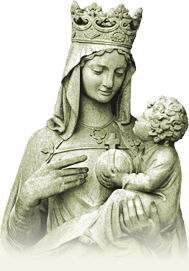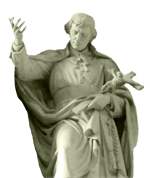Religion-Philosophy-History
Evolutionism: scientific dogma or theosofic thesis? - Fedeli, Vanini, Oliveira
The evolutionism is one of the "modern mentality dogmas. It passed the line of the purely biological field, and it is applied to everything: nothing more is considered stable, because it is believed that everything evolves. In this sense, the belief in the evolutionism can be pointed as one of the triumphant relativism causes in our days. The amplitude attributed to the evolutionism belongs to such metaphysical way that it reaches the religious sphere. Besides, the evolutionism has been raising debates not only between atheistic and believing, but between scientists himself. Therefore, the debate just isn't between faith and reason -- what is a false dilemma -- but it argues more profoundly if the evolution theory is a true science. In this work is shown that the evolutionism relations with the pantheism and gnose, with the nazism and the marxism and more. We show also the frauds that the evolutionists forged and scientists' several renowned samples opposites to the evolution vanity. We argue also - on the other side than thinks - as the fossils introduce a problem for the evolutionists. Finally, we introduce the man origin problem and the consequences for the faith.Esoteric and Cabalistic elements at Anna Katharina Emmerick’s visions - Orlando Fedeli
Only recently has a non-biased study about Anna Katharina Emmerick’s life started being done thanks to the publishing of original texts by Brentano. Even so, the case Katharina Emmerick still stirs lots of controversies.Mohammed: the origins of Islam - Orlando Fedeli
We present this article as a reply against an aggressive and blasphemical Muslim article, which attacks the Divinity of Our Lord Jesus Christ, declaring it is only an old myth. The author, injuriously, compares Christ to Adonis, Osiris and other mythological beings, and clearly declares that he wants to destroy the 'myth' of Jesus Christ, our Redeemer.
We restrain our study mostly on quotations from the Center of Islamic Propagation in Latin America, study made by Aminuddin Mohamad. This unsuspected book gives us precious pieces of information about what happened, in fact, at Arabia in the 7th century, in the beginning of Mohammed preaching. Aminuddin Mohamad, in his book, shows a deep influence, and almost an alliance, between Jews and Mohammed, at least in the beginning of Islam.Maurice Zundel: a scandalous and barefaced heretic - Orlando Fedeli
Imagine if you hear someone say that he believes Christ is just as present in a soup as in the consecrated Host, in the Mass.Any Catholic would consider that such a person either does not believe in Jesus’ real presence in the consecrated Host, or is a pan-christic Gnostic, such as Teilhard de Chardin.Either way, whoever makes such a scandalous statement would be taken as a heretic.Why should we draw any other conclusion, in case it was a priest who made such a scandalous and malicious statement?Why would we leave logic aside, in case the person who asserted this phrase, which is definitely savoring of heresy, was a priest and a friend of Pope Paul VI?For Maurice Zundel was a friend of Mgr. Giovanni Batista Montini – who will become Paul VI – since 1923. It was he who wrote the following sentence, unbelievable from the hands of a priest:“I lay as much devotion in having a soup, as in celebrating the mass, for we are always at the Lord’s Table, and it is from his hand that we receive the food, symbol of his love”.Jean Guitton and the Modernism on II Vatican Council: Report from Brescia - Paul VI Institute in Brescia, Italy
From the series of articles that we have published about the personality and thinking of Jean Guitton – considered to be the greatest philosopher of the 20th century, close friend of Paul VI and who took part at the sections of the Vatican II – we have submitted his most serious and revealing confession, about the influence of the Modernism in the II Vatican Council , to the advice of many theologians, among those the Istituto Paolo VI di Brescia, the greatest source of documentation and studies about Pope Paul VI, one of the Popes of the Vatican II.
We introduce, in this edition, the "Report" from that "Institute", along with our reply-comments, published in the sequence.Jean Guitton and the Modernism on II Vatican Council: Reply to the Report from Brescia - Orlando Fedeli
About the grave confession from Guitton, Istituto Paolo VI di Brescia has restrained itself in its "Report", applying it solely to the ambit of “Revelation”, understood according to the Dei Verbum document, when Guitton has referred to the influence of the Modernism in the Vatican II in wide sense. Despite of that, the very "Report" from Istituto Paolo VI di Brescia ends up also confirming Guitton's most serious confession, since Dei Verbum follows the “New Theology” doctrine, whose foundations are found in the Gnostic conception of “Revelation”, proclaimed by the Modernist heresy, and condemned by St. Pious X in 1907, and presented in our commentary.
It is from this new Gnostic concept of “Revelation”, introduced in the Church by means of the II Vatican Council, as confessed by Guitton, that, by affecting the Dogma, has propitiated the rising of so many other modernist news, such as the new concept of Church, along with its painfully famous "subsistit", the collegiality, religious freedom, ecumenism, etc. Obviously, however, in our reply-comments to the learned “Report” from Istituto Paolo VI di Brescia, we will deal with the influence of Modernism in the II Vatican Council also restraining it to the matter of “Revelation”, following the "Report".








